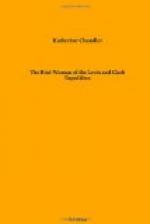He took off his blanket.
He took hold of it by two corners.
He threw it up high.
Then he put it on the ground.
This showed that he was putting down a skin for a friend to sit on.
He did this three times.
Then the strangers came up to him.
They sat down together.
They took off their moccasins.
This showed that they wished to be true friends.
If they were not true friends, they would go barefooted all their days.
They thought it hard to go barefooted.
The ground was covered with prickly pears.
The prickly pears would hurt their feet.
great pres ents smoked pipes send Wash ing ton
When the strangers had their moccasins off, they smoked
some pipes
together.
Then they gave each other presents.
Then they told each other why they had come together.
Captain Lewis and Captain Clark always told the Indians:
“We have come from the Great Father in Washington.
He sends you these presents.
He wants you to be friends with the white men.
He wants you to be friends with the other Indians.
When you all are friends, the men can get many animals
and the women can
get many roots.
The Great Father will send you out the white men’s
goods when you are
all friends.”
The Indians always said to Lewis and Clark:
“We are glad to hear from the Great Father in
Washington.
We like his presents.
We shall be glad to get the white men’s goods.
We will be friends with all men with Indians and with
white men.”
a fraid com pass canoe straight ened turned hit rud der
SACAJAWEA SAVES THE CAPTAINS’ GOODS.
Going up the Missouri, the compass, the books, and
the maps were in one
canoe.
The captains had the compass to find the West.
One day a big wind hit this canoe and turned it nearly
over.
Sacajawea’s husband was at the rudder.
He was afraid and let go. The water came into
the canoe.
The maps and books came up to the top of the water.
Sacajawea saw them going out into the river.
She took the compass into her lap.
She caught the books.
She called to her husband.
He took the rudder again.
He straightened the boat again.
Then Sacajawea caught the maps that were on top of
the river.
Crook ed Mon ta na wide hand some saved yards
SACAJAWEA’S RIVER.
As the maps and books were wet, the soldiers had to camp two days. They put the maps and the books and the compass in the sun. When these were dry, they went on again. Ten days after, they came to a river that no white man had seen before. Captain Lewis wrote in his book, “It is a handsome river about 50 yards wide.” They did not know the Indian name for it. The captains were




